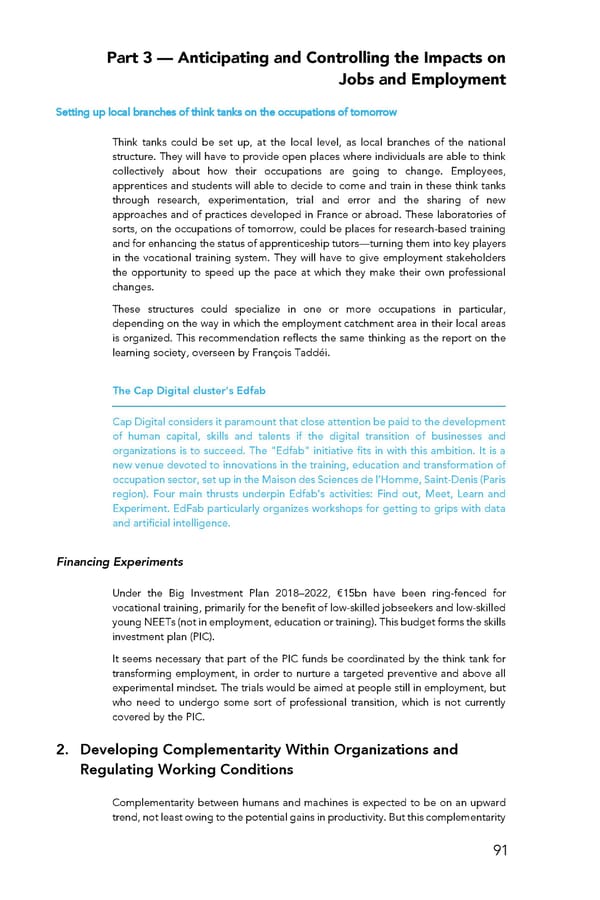Part 3 — Anticipating and Controlling the Impacts on Jobs and Employment Setting up local branches of think tanks on the occupations of tomorrow Think tanks could be set up, at the local level, as local branches of the national structure. They will have to provide open places where individuals are able to think collectively about how their occupations are going to change. Employees, apprentices and students will able to decide to come and train in these think tanks through research, experimentation, trial and error and the sharing of new approaches and of practices developed in France or abroad. These laboratories of sorts, on the occupations of tomorrow, could be places for research-based training and for enhancing the status of apprenticeship tutors—turning them into key players in the vocational training system. They will have to give employment stakeholders the opportunity to speed up the pace at which they make their own professional changes. These structures could specialize in one or more occupations in particular, depending on the way in which the employment catchment area in their local areas is organized. This recommendation reflects the same thinking as the report on the learning society, overseen by François Taddéi. The Cap Digital cluster's Edfab Cap Digital considers it paramount that close attention be paid to the development of human capital, skills and talents if the digital transition of businesses and organizations is to succeed. The "Edfab" initiative fits in with this ambition. It is a new venue devoted to innovations in the training, education and transformation of occupation sector, set up in the Maison des Sciences de l’Homme, Saint-Denis (Paris region). Four main thrusts underpin Edfab's activities: Find out, Meet, Learn and Experiment. EdFab particularly organizes workshops for getting to grips with data and artificial intelligence. Financing Experiments Under the Big Investment Plan 2018–2022, €15bn have been ring-fenced for vocational training, primarily for the benefit of low-skilled jobseekers and low-skilled young NEETs (not in employment, education or training). This budget forms the skills investment plan (PIC). It seems necessary that part of the PIC funds be coordinated by the think tank for transforming employment, in order to nurture a targeted preventive and above all experimental mindset. The trials would be aimed at people still in employment, but who need to undergo some sort of professional transition, which is not currently covered by the PIC. 2. Developing Complementarity Within Organizations and Regulating Working Conditions Complementarity between humans and machines is expected to be on an upward trend, not least owing to the potential gains in productivity. But this complementarity 91
 For a Meaningful AI - Report Page 91 Page 93
For a Meaningful AI - Report Page 91 Page 93